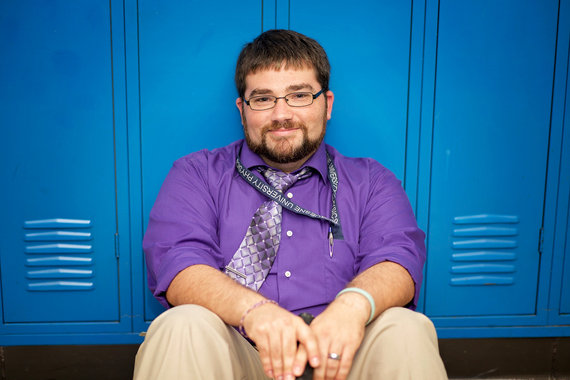Justin Aion: Why Do We Send Kids to School?
We need to have a prolonged discussion on the purpose of education. Everyone needs to be part of that conversation -- parents, kids, teachers, administrators, everyone.

Teaching for their glory, not ours.
"In my heart, I've always been a teacher. I have this tendency to explain things to people -- whether or not they want me to. I started in the classroom eight years ago thinking everything was great and that I was going to change the world, but everything came crashing down pretty quickly. It took me awhile to understand that I had a lot to learn. I'm a much better teacher now and keep getting better as the years go by. But I also acknowledge that I know less and less, and the acceptance of that makes me better at what I do.
You don't get into teaching for the glory. I don't drive my Ferrari to school and then peel out after the bus to go home and swim in my pool of money. We're here to glorify our students, to show the work that they've done and how much better they are than they were yesterday. We elevate our kids and put them out there so everyone else can cheer on what they do."
Making the "aha" moments last.
"Woodland Hills is a very interesting district. It runs the entire socio-economic gamut, making the situation a huge argument for individual education. There's a lot of opportunity and growth that can come from showing the kids what lies beyond their communities. That's been a huge push for me: I want them to see what happens outside of their own spheres. The more I can relate my classroom to the outside world and help them realize that they're part of something bigger, the better I am able to do my job.
But I want them to be the ones making the discoveries. We talk about these 'aha' moments, where the kids have these revelations about something they didn't know before. I don't really like the 'aha' moments -- I don't think they last. I prefer the 'holy crap' moments, where the kids look at something they're doing and say, 'Holy crap, this is so cool!' That kind of passion and interest expands outward and helps them see something they're interested in and explore it further. I want my students to find their passions, and the best way I can do that is by facilitating those discussions and bringing in those outside sources."
A question to change the discussion.
"I am a great supporter of the Common Core because it emphasizes skills. But I have a tremendous amount of difficulty grasping how we can come up with standards for all of education when we have yet to have a prolonged discussion on the purpose of education: why do we send kids to school? Everyone needs to be part of that conversation -- parents, kids, teachers, administrators, everyone.
Up until the mid-nineties, the purpose of public education was to get kids ready for the workforce. We wanted kids to be successful, productive workers -- but that's not really true everywhere anymore, especially with the push toward Common Core. Are we looking at education to benefit society or individual students? Do individual students have different needs from education than society?
Based on our service-oriented economy, shouldn't we be training kids to be waiters, Justin Aion: Why Do We Send Kids to School? | A Teacher Like You:
